新目标浙江中考英语二轮复习语法篇--名词(共28张PPT)
文档属性
| 名称 | 新目标浙江中考英语二轮复习语法篇--名词(共28张PPT) |  | |
| 格式 | zip | ||
| 文件大小 | 2.5MB | ||
| 资源类型 | 试卷 | ||
| 版本资源 | 人教新目标(Go for it)版 | ||
| 科目 | 英语 | ||
| 更新时间 | 2021-03-25 15:32:36 | ||
图片预览

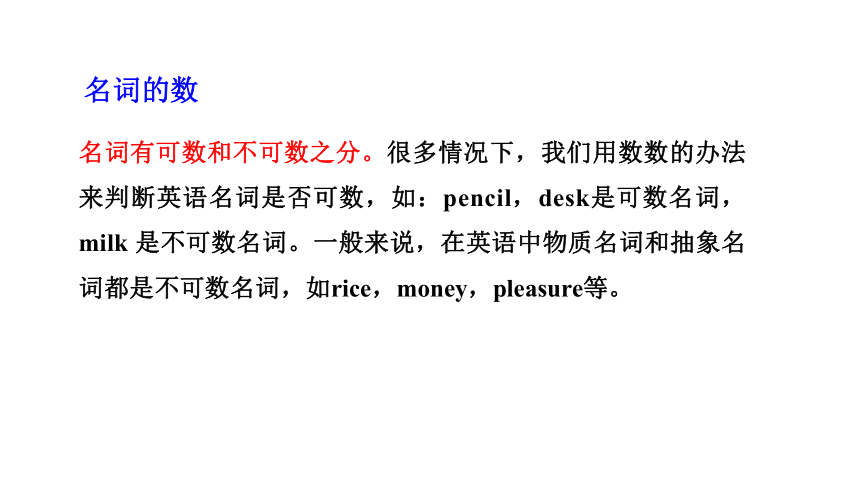
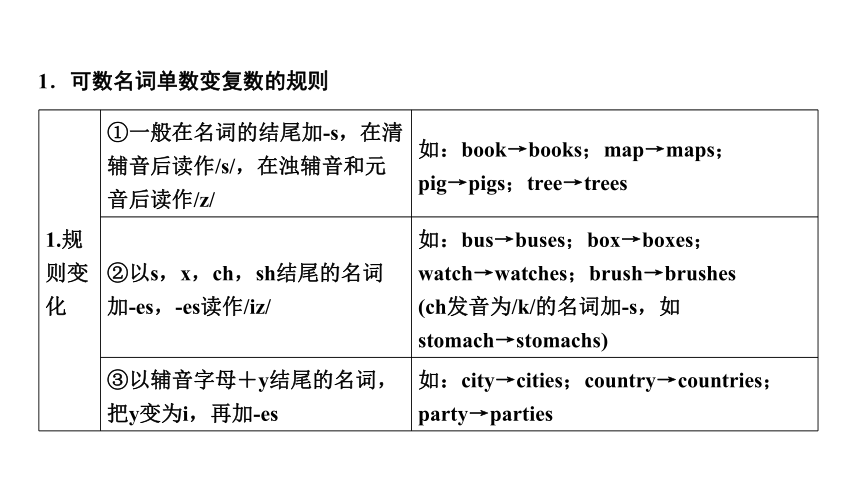
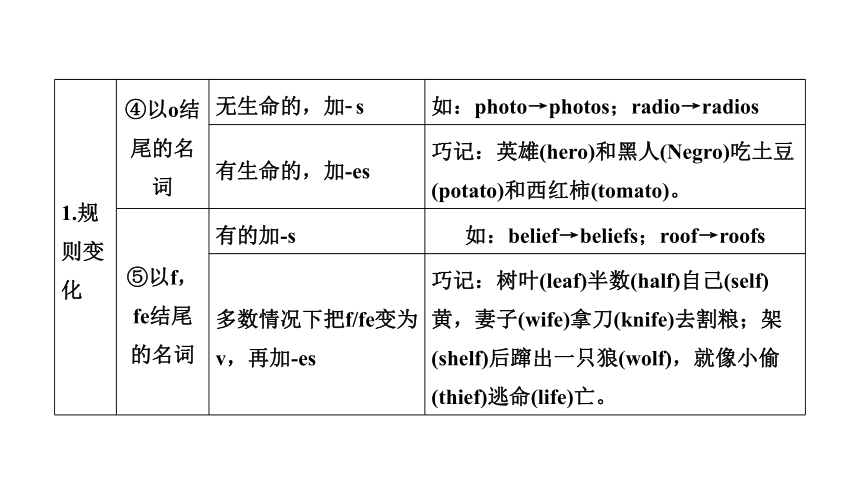
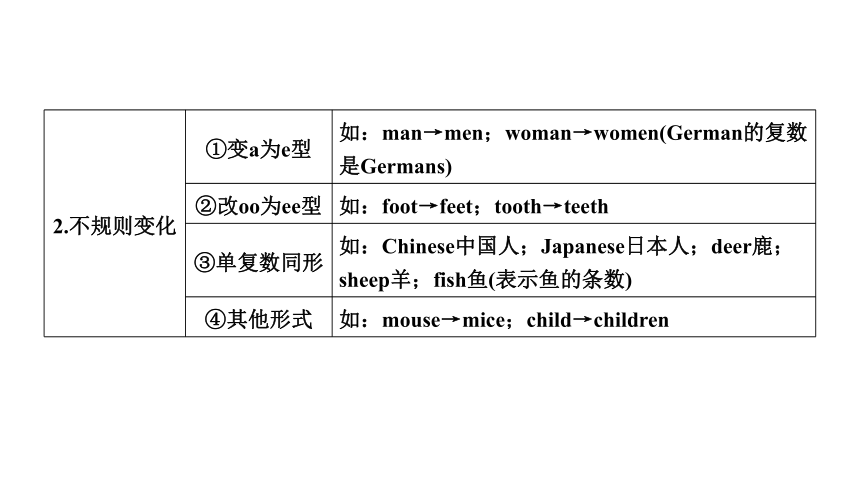
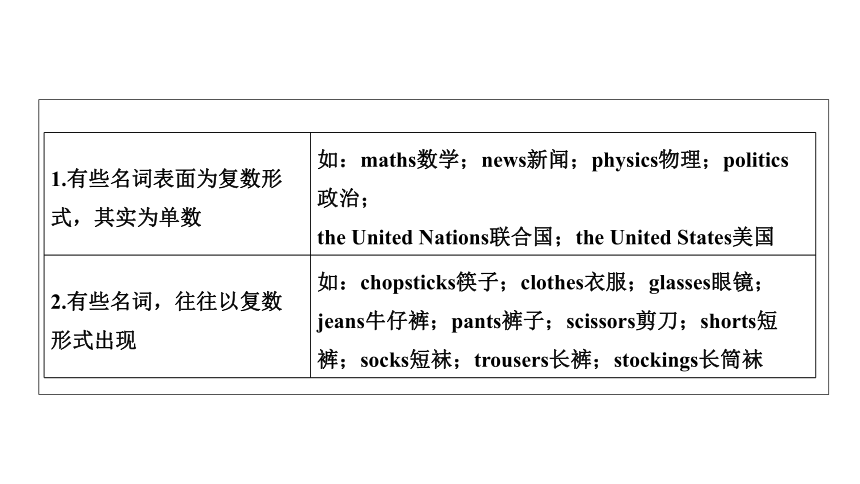
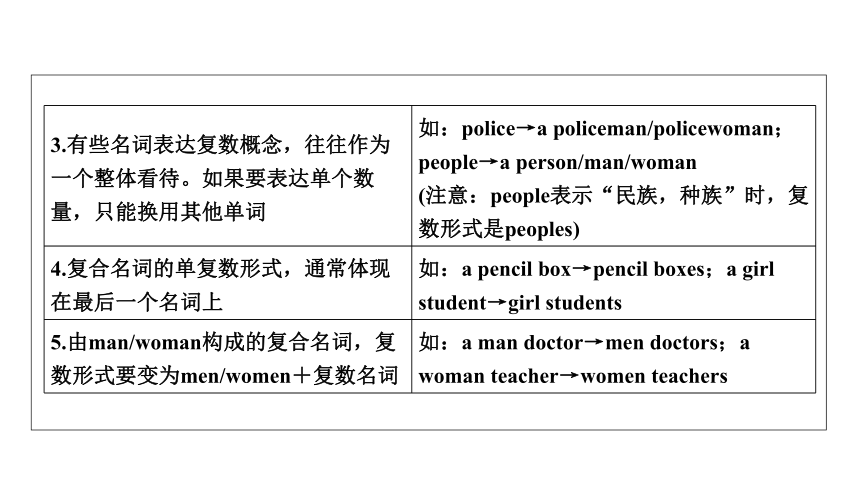
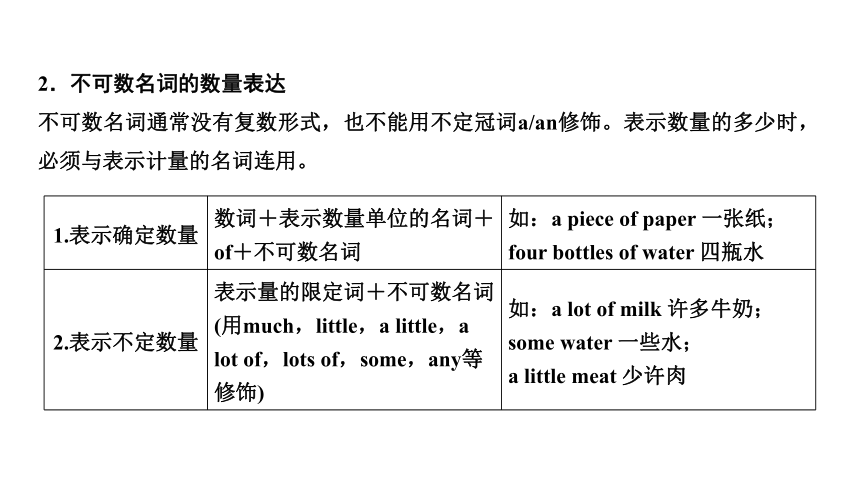
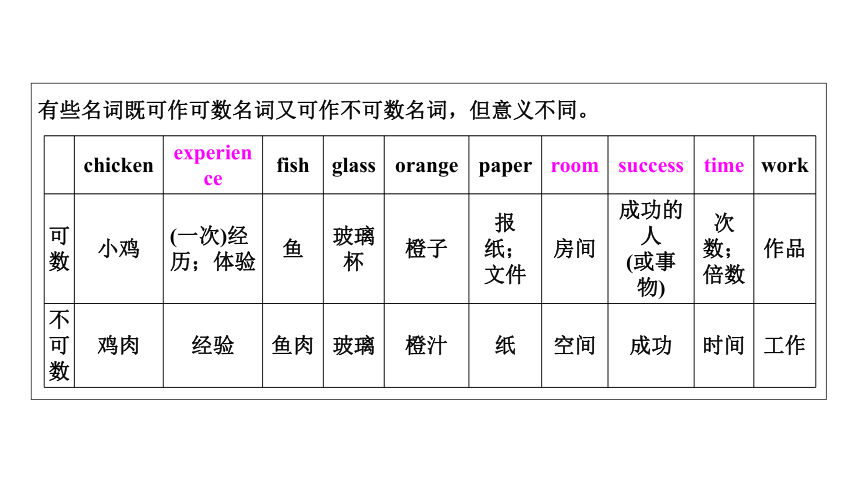
文档简介
(共28张PPT)
中考二轮复习
语法篇
名词
名词有可数和不可数之分。很多情况下,我们用数数的办法来判断英语名词是否可数,如:pencil,desk是可数名词,milk
是不可数名词。一般来说,在英语中物质名词和抽象名词都是不可数名词,如rice,money,pleasure等。
名词的数
1.可数名词单数变复数的规则
1.规则变化
①一般在名词的结尾加?s,在清辅音后读作/s/,在浊辅音和元音后读作/z/
如:book→books;map→maps;pig→pigs;tree→trees
②以s,x,ch,sh结尾的名词加?es,?es读作/iz/
如:bus→buses;box→boxes;watch→watches;brush→brushes
(ch发音为/k/的名词加?s,如stomach→stomachs)
③以辅音字母+y结尾的名词,把y变为i,再加?es
如:city→cities;country→countries;party→parties
1.规则变化
④以o结尾的名词
无生命的,加?s
如:photo→photos;radio→radios
有生命的,加?es
巧记:英雄(hero)和黑人(Negro)吃土豆(potato)和西红柿(tomato)。
⑤以f,fe结尾的名词
有的加?s
如:belief→beliefs;roof→roofs
多数情况下把f/fe变为v,再加?es
巧记:树叶(leaf)半数(half)自己(self)
黄,妻子(wife)拿刀(knife)去割粮;架(shelf)后蹿出一只狼(wolf),就像小偷(thief)逃命(life)亡。
2.不规则变化
①变a为e型
如:man→men;woman→women(German的复数是Germans)
②改oo为ee型
如:foot→feet;tooth→teeth
③单复数同形
如:Chinese中国人;Japanese日本人;deer鹿;sheep羊;fish鱼(表示鱼的条数)
④其他形式
如:mouse→mice;child→children
1.有些名词表面为复数形式,其实为单数
如:maths数学;news新闻;physics物理;politics政治;
the
United
Nations联合国;the
United
States美国
2.有些名词,往往以复数形式出现
如:chopsticks筷子;clothes衣服;glasses眼镜;jeans牛仔裤;pants裤子;scissors剪刀;shorts短
裤;socks短袜;trousers长裤;stockings长筒袜
3.有些名词表达复数概念,往往作为一个整体看待。如果要表达单个数
量,只能换用其他单词
如:police→a
policeman/policewoman;people→a
person/man/woman
(注意:people表示“民族,种族”时,复数形式是peoples)
4.复合名词的单复数形式,通常体现在最后一个名词上
如:a
pencil
box→pencil
boxes;a
girl
student→girl
students
5.由man/woman构成的复合名词,复数形式要变为men/women+复数名词
如:a
man
doctor→men
doctors;a
woman
teacher→women
teachers
2.不可数名词的数量表达
不可数名词通常没有复数形式,也不能用不定冠词a/an修饰。表示数量的多少时,必须与表示计量的名词连用。
1.表示确定数量
数词+表示数量单位的名词+of+不可数名词
如:a
piece
of
paper
一张纸;
four
bottles
of
water
四瓶水
2.表示不定数量
表示量的限定词+不可数名词
(用much,little,a
little,a
lot
of,lots
of,some,any等修饰)
如:a
lot
of
milk
许多牛奶;some
water
一些水;
a
little
meat
少许肉
有些名词既可作可数名词又可作不可数名词,但意义不同。
chicken
experience
fish
glass
orange
paper
room
success
time
work
可数
小鸡
(一次)经历;体验
鱼
玻璃杯
橙子
报
纸;文件
房间
成功的人
(或事
物)
次
数;倍数
作品
不可数
鸡肉
经验
鱼肉
玻璃
橙汁
纸
空间
成功
时间
工作
arms
meals
eroes
anuary
跟踪训练
caps
Children
boxes
名词的辨析考查学生对名词词义和整个句子意思的理解。以下为部分常见的名词辨析:
1.“数目,数量”
amount
an/the
amount
of+不可数名词
2.“课
程,科
目”
course
指课程(可包括多门科
目),如:
a
summer
course
number
a/the
number
of+可数名词
subject
指科目(具体的学科)
名词的辨析
3.“衣服”
clothes
统指各种衣服,谓语动词永远是复数
4.“演讲”
speech
指在公共场合所做的经过准备的较正式的演说
cloth
指布料,为不可数名词
talk
指日常生活中的一般的谈话
clothing
表示服装的总称,指一件衣服用a
piece
of,an
article
of
lecture
指学术性的演讲、讲课
5.“路”
road
指具体的公路、马路
6.“国
家”
country
侧重于版图、疆域
street
指街道
nation
指人民、国民、民族
path
指小路、小径
state
侧重指政府、政体
way
指道路、途径
land
表示国土、国家
7.“风
俗,习
惯”
custom
指传统风俗、习俗,也可指生活习惯,后接to
do
8.“原
因”
cause
指造成某一事实或现象的直接原因,后接
of
sth./doing
sth.
habit
多指生活习惯,后接
of
doing,如:the
habit
of
drinking
tea
reason
用来解释某种现象或结果的理由,后接for
sth./doing
sth.
1.—Betty,when
do
you
often
read
books?
—I
have
the
____________(custom/habit)of
reading
before
sleeping.It
has
been
part
of
my
life.
2.The
waiters
in
the
restaurant
are
well?trained
and
friendly.Most
people
are
pleased
with
the
____________(dishes/service)there.
3.—Did
the
book
give
the
____________(information/message)you
needed?
—Yes.But
to
find
it,I
had
to
read
the
whole
book.
4.Would
you
please
give
me
some
____________(advice/suggestion)on
how
to
learn
English
well?
habit
service
information
advice
跟踪训练
名词所有格用于表示名词之间的所有关系。其常见用法如下:
1.'s所有格
①有生命的单数名词,一般在词尾加?'s
如:my
mother's
bag
我妈妈的包;
Tom's
father
汤姆的爸爸
②有生命的复数名词,以?s结尾在词尾加?',不以?s结尾在词尾加?'s
如:the
boys'
game
男孩们的游戏;the
ladies'
dresses
女士们的裙子;the
children's
footballs
孩子们的足球
③表示共同拥有,只在最后一个名词后加?'s
如:Jack
and
David's
room(共同的房间)
④表示分别拥有,各名词后都加?'s
如:Jack's
and
David's
rooms(各自的房间)
⑤表示时间、距离、国家等的名词,单数加?'s,复数加?'
如:a
month's
holiday
一个月的假期;
ten
minutes'
drive
十分钟的车程;
China's
population
中国的人口
名词所有格
2.of所有格
“名词+of+名词”,通常表示无生命名词的所属关系
如:a
map
of
the
world
一幅世界地图;
the
window
of
the
classroom
教室的这扇窗
3.双重所有格
①“of+名词所有格”
如:a
teacher
of
Mary's玛丽的一位老师
②“of+名词性物主代词”
如:a
picture
of
mine我的一幅图片
Teachers'
sister's
Lucy
and
Lily's
heads
hers
hours'
跟踪训练
一、名词+?ly
1.friend→____________
友好的 2.week→____________
每周的
3.love→____________
可爱的
4.month→____________
每月的
二、名词+?ful
1.meaning→____________
有意义的
2.care→____________
小心的
3.help→____________
有用的
4.colour→____________
颜色鲜艳的
5.pain→____________
痛苦的
6.joy→____________
高兴的
7.use→____________
有用的
8.peace→____________
平静的,宁静的
friendly
weekly
lovely
monthly
meaningful
careful
helpful
colourful
painful
joyful
useful
peaceful
名词转化
9.play→____________
顽皮的,爱玩耍的
10.success→____________
成功的
11.power→____________
有影响力的
12.harm→____________
有害的
13.truth→____________
真实的
14.wonder→____________
绝妙的
15.cheer→____________
兴高采烈的
三、名词+?ese或?n(构成表示国籍的形容词)
1.China→____________
中国的;中国人的
2.Japan→____________
日本的;日本人的
3.Asia→____________
亚洲的;亚洲人的
4.Africa→____________
非洲的;非洲人的
5.America→____________
美国的;美国人的;美洲的
6.India→____________
印度的;印度人的
successful
powerful
harmful
truthful
wonderful
cheerful
playful
Chinese
Japanese
Asian
African
American
Indian
四、名词+?y(含双写最后一个字母/去?e)
1.anger→____________
生气的
2.hunger→____________
饥饿的
3.fog→____________
有雾的
4.fur→____________
毛茸茸的
5.fun→____________
有趣的
6.noise→____________
吵闹的
7.guilt→____________
内疚的
8.health→____________
健康的
9.luck→____________
幸运的
10.cloud→____________
多云的
11.sun→____________
晴朗的
12.snow→____________
下雪的
13.wind→____________
多风的
14.rain→____________
多雨的
15.salt→____________
咸的
16.shine→____________
闪亮的
17.silk→____________
丝绸一样的
18.sleep→____________
困的
19.taste→____________
美味的
angry
hungry
foggy
furry
funny
noisy
guilty
healthy
lucky
cloudy
sunny
snowy
windy
rainy
salty
shiny
silky
sleepy
tasty
五、名词+?al(含去?e)
1.centre→____________
中心的
2.culture→____________
文化的
3.nature→____________
大自然的
4.person→____________
个人的
5.music→____________
音乐的
6.nation→____________
国家的
7.education→____________
教育的
8.tradition→____________
传统的
9.origin→____________
新颖的;独创的10.practice→____________
实际的
六、名词+?ous
1.danger→____________
危险的
2.humor→____________
幽默的
七、名词+?less(构成表示否定意义的形容词)
1.care→____________
粗心的
2.use→____________
无用的
central
cultural
natural
personal
musical
national
educational
traditional
original
practical
dangerous
humorous
careless
useless
3.help→____________
无助的
4.home→____________
无家可归的
5.end→____________
无止境的
6.hope→____________
无望的
7.meaning→____________
无意义的
八、以?ence结尾的名词,变?ence为?ent
1.confidence→____________
自信的
2.difference→____________
不同的
3.silence→____________
寂静的
4.patience→____________
耐心的
九、名词+?ed(含双写最后一个字母/去?e)
1.balance→____________
平衡的
2.spot→____________
有斑点的
3.talent→____________
有天赋的
4.disgust→____________
厌恶的
5.crowd→____________
拥挤的
homeless
endless
hopeless
meaningless
helpless
confident
different
silent
patient
balanced
spotted
talented
disgusted
crowded
十、名词+?able(含去?e)
1.comfort→____________
舒适的
2.fashion→____________
时髦的
3.value→____________
贵重的
4.knowledge→______________
有知识的
十一、名词+?e(r)n
1.wood→____________
木制的
2.wool→____________
羊毛的
3.gold→____________
金色的
4.east→____________
东方的
5.west→____________
西方的
6.south→____________
南方的
7.north→____________
北方的
十二、其他
1.energy→____________
精力充沛的
2.fool→____________
愚蠢的
3.interest→____________
有趣的
4.scientist→____________
科学的
5.pleasure→____________/____________
使人愉快的/开心的
6.pride→____________
感到自豪的
7.Europe→____________
欧洲的
comfortable
valuable
knowledgeable
wooden
woolen
golden
eastern
western
southern
northern
fashionable
energetic
foolish
interesting
scientific
pleasant
pleased
proud
European
8.medicine→____________
医学的
9.Canada→____________
加拿大的;加拿大人的
medical
Canadian
lucky
interested
sunny
friendly
southeastern
dangerous
跟踪训练
https://www.21cnjy.com/help/help_extract.php
中考二轮复习
语法篇
名词
名词有可数和不可数之分。很多情况下,我们用数数的办法来判断英语名词是否可数,如:pencil,desk是可数名词,milk
是不可数名词。一般来说,在英语中物质名词和抽象名词都是不可数名词,如rice,money,pleasure等。
名词的数
1.可数名词单数变复数的规则
1.规则变化
①一般在名词的结尾加?s,在清辅音后读作/s/,在浊辅音和元音后读作/z/
如:book→books;map→maps;pig→pigs;tree→trees
②以s,x,ch,sh结尾的名词加?es,?es读作/iz/
如:bus→buses;box→boxes;watch→watches;brush→brushes
(ch发音为/k/的名词加?s,如stomach→stomachs)
③以辅音字母+y结尾的名词,把y变为i,再加?es
如:city→cities;country→countries;party→parties
1.规则变化
④以o结尾的名词
无生命的,加?s
如:photo→photos;radio→radios
有生命的,加?es
巧记:英雄(hero)和黑人(Negro)吃土豆(potato)和西红柿(tomato)。
⑤以f,fe结尾的名词
有的加?s
如:belief→beliefs;roof→roofs
多数情况下把f/fe变为v,再加?es
巧记:树叶(leaf)半数(half)自己(self)
黄,妻子(wife)拿刀(knife)去割粮;架(shelf)后蹿出一只狼(wolf),就像小偷(thief)逃命(life)亡。
2.不规则变化
①变a为e型
如:man→men;woman→women(German的复数是Germans)
②改oo为ee型
如:foot→feet;tooth→teeth
③单复数同形
如:Chinese中国人;Japanese日本人;deer鹿;sheep羊;fish鱼(表示鱼的条数)
④其他形式
如:mouse→mice;child→children
1.有些名词表面为复数形式,其实为单数
如:maths数学;news新闻;physics物理;politics政治;
the
United
Nations联合国;the
United
States美国
2.有些名词,往往以复数形式出现
如:chopsticks筷子;clothes衣服;glasses眼镜;jeans牛仔裤;pants裤子;scissors剪刀;shorts短
裤;socks短袜;trousers长裤;stockings长筒袜
3.有些名词表达复数概念,往往作为一个整体看待。如果要表达单个数
量,只能换用其他单词
如:police→a
policeman/policewoman;people→a
person/man/woman
(注意:people表示“民族,种族”时,复数形式是peoples)
4.复合名词的单复数形式,通常体现在最后一个名词上
如:a
pencil
box→pencil
boxes;a
girl
student→girl
students
5.由man/woman构成的复合名词,复数形式要变为men/women+复数名词
如:a
man
doctor→men
doctors;a
woman
teacher→women
teachers
2.不可数名词的数量表达
不可数名词通常没有复数形式,也不能用不定冠词a/an修饰。表示数量的多少时,必须与表示计量的名词连用。
1.表示确定数量
数词+表示数量单位的名词+of+不可数名词
如:a
piece
of
paper
一张纸;
four
bottles
of
water
四瓶水
2.表示不定数量
表示量的限定词+不可数名词
(用much,little,a
little,a
lot
of,lots
of,some,any等修饰)
如:a
lot
of
milk
许多牛奶;some
water
一些水;
a
little
meat
少许肉
有些名词既可作可数名词又可作不可数名词,但意义不同。
chicken
experience
fish
glass
orange
paper
room
success
time
work
可数
小鸡
(一次)经历;体验
鱼
玻璃杯
橙子
报
纸;文件
房间
成功的人
(或事
物)
次
数;倍数
作品
不可数
鸡肉
经验
鱼肉
玻璃
橙汁
纸
空间
成功
时间
工作
arms
meals
eroes
anuary
跟踪训练
caps
Children
boxes
名词的辨析考查学生对名词词义和整个句子意思的理解。以下为部分常见的名词辨析:
1.“数目,数量”
amount
an/the
amount
of+不可数名词
2.“课
程,科
目”
course
指课程(可包括多门科
目),如:
a
summer
course
number
a/the
number
of+可数名词
subject
指科目(具体的学科)
名词的辨析
3.“衣服”
clothes
统指各种衣服,谓语动词永远是复数
4.“演讲”
speech
指在公共场合所做的经过准备的较正式的演说
cloth
指布料,为不可数名词
talk
指日常生活中的一般的谈话
clothing
表示服装的总称,指一件衣服用a
piece
of,an
article
of
lecture
指学术性的演讲、讲课
5.“路”
road
指具体的公路、马路
6.“国
家”
country
侧重于版图、疆域
street
指街道
nation
指人民、国民、民族
path
指小路、小径
state
侧重指政府、政体
way
指道路、途径
land
表示国土、国家
7.“风
俗,习
惯”
custom
指传统风俗、习俗,也可指生活习惯,后接to
do
8.“原
因”
cause
指造成某一事实或现象的直接原因,后接
of
sth./doing
sth.
habit
多指生活习惯,后接
of
doing,如:the
habit
of
drinking
tea
reason
用来解释某种现象或结果的理由,后接for
sth./doing
sth.
1.—Betty,when
do
you
often
read
books?
—I
have
the
____________(custom/habit)of
reading
before
sleeping.It
has
been
part
of
my
life.
2.The
waiters
in
the
restaurant
are
well?trained
and
friendly.Most
people
are
pleased
with
the
____________(dishes/service)there.
3.—Did
the
book
give
the
____________(information/message)you
needed?
—Yes.But
to
find
it,I
had
to
read
the
whole
book.
4.Would
you
please
give
me
some
____________(advice/suggestion)on
how
to
learn
English
well?
habit
service
information
advice
跟踪训练
名词所有格用于表示名词之间的所有关系。其常见用法如下:
1.'s所有格
①有生命的单数名词,一般在词尾加?'s
如:my
mother's
bag
我妈妈的包;
Tom's
father
汤姆的爸爸
②有生命的复数名词,以?s结尾在词尾加?',不以?s结尾在词尾加?'s
如:the
boys'
game
男孩们的游戏;the
ladies'
dresses
女士们的裙子;the
children's
footballs
孩子们的足球
③表示共同拥有,只在最后一个名词后加?'s
如:Jack
and
David's
room(共同的房间)
④表示分别拥有,各名词后都加?'s
如:Jack's
and
David's
rooms(各自的房间)
⑤表示时间、距离、国家等的名词,单数加?'s,复数加?'
如:a
month's
holiday
一个月的假期;
ten
minutes'
drive
十分钟的车程;
China's
population
中国的人口
名词所有格
2.of所有格
“名词+of+名词”,通常表示无生命名词的所属关系
如:a
map
of
the
world
一幅世界地图;
the
window
of
the
classroom
教室的这扇窗
3.双重所有格
①“of+名词所有格”
如:a
teacher
of
Mary's玛丽的一位老师
②“of+名词性物主代词”
如:a
picture
of
mine我的一幅图片
Teachers'
sister's
Lucy
and
Lily's
heads
hers
hours'
跟踪训练
一、名词+?ly
1.friend→____________
友好的 2.week→____________
每周的
3.love→____________
可爱的
4.month→____________
每月的
二、名词+?ful
1.meaning→____________
有意义的
2.care→____________
小心的
3.help→____________
有用的
4.colour→____________
颜色鲜艳的
5.pain→____________
痛苦的
6.joy→____________
高兴的
7.use→____________
有用的
8.peace→____________
平静的,宁静的
friendly
weekly
lovely
monthly
meaningful
careful
helpful
colourful
painful
joyful
useful
peaceful
名词转化
9.play→____________
顽皮的,爱玩耍的
10.success→____________
成功的
11.power→____________
有影响力的
12.harm→____________
有害的
13.truth→____________
真实的
14.wonder→____________
绝妙的
15.cheer→____________
兴高采烈的
三、名词+?ese或?n(构成表示国籍的形容词)
1.China→____________
中国的;中国人的
2.Japan→____________
日本的;日本人的
3.Asia→____________
亚洲的;亚洲人的
4.Africa→____________
非洲的;非洲人的
5.America→____________
美国的;美国人的;美洲的
6.India→____________
印度的;印度人的
successful
powerful
harmful
truthful
wonderful
cheerful
playful
Chinese
Japanese
Asian
African
American
Indian
四、名词+?y(含双写最后一个字母/去?e)
1.anger→____________
生气的
2.hunger→____________
饥饿的
3.fog→____________
有雾的
4.fur→____________
毛茸茸的
5.fun→____________
有趣的
6.noise→____________
吵闹的
7.guilt→____________
内疚的
8.health→____________
健康的
9.luck→____________
幸运的
10.cloud→____________
多云的
11.sun→____________
晴朗的
12.snow→____________
下雪的
13.wind→____________
多风的
14.rain→____________
多雨的
15.salt→____________
咸的
16.shine→____________
闪亮的
17.silk→____________
丝绸一样的
18.sleep→____________
困的
19.taste→____________
美味的
angry
hungry
foggy
furry
funny
noisy
guilty
healthy
lucky
cloudy
sunny
snowy
windy
rainy
salty
shiny
silky
sleepy
tasty
五、名词+?al(含去?e)
1.centre→____________
中心的
2.culture→____________
文化的
3.nature→____________
大自然的
4.person→____________
个人的
5.music→____________
音乐的
6.nation→____________
国家的
7.education→____________
教育的
8.tradition→____________
传统的
9.origin→____________
新颖的;独创的10.practice→____________
实际的
六、名词+?ous
1.danger→____________
危险的
2.humor→____________
幽默的
七、名词+?less(构成表示否定意义的形容词)
1.care→____________
粗心的
2.use→____________
无用的
central
cultural
natural
personal
musical
national
educational
traditional
original
practical
dangerous
humorous
careless
useless
3.help→____________
无助的
4.home→____________
无家可归的
5.end→____________
无止境的
6.hope→____________
无望的
7.meaning→____________
无意义的
八、以?ence结尾的名词,变?ence为?ent
1.confidence→____________
自信的
2.difference→____________
不同的
3.silence→____________
寂静的
4.patience→____________
耐心的
九、名词+?ed(含双写最后一个字母/去?e)
1.balance→____________
平衡的
2.spot→____________
有斑点的
3.talent→____________
有天赋的
4.disgust→____________
厌恶的
5.crowd→____________
拥挤的
homeless
endless
hopeless
meaningless
helpless
confident
different
silent
patient
balanced
spotted
talented
disgusted
crowded
十、名词+?able(含去?e)
1.comfort→____________
舒适的
2.fashion→____________
时髦的
3.value→____________
贵重的
4.knowledge→______________
有知识的
十一、名词+?e(r)n
1.wood→____________
木制的
2.wool→____________
羊毛的
3.gold→____________
金色的
4.east→____________
东方的
5.west→____________
西方的
6.south→____________
南方的
7.north→____________
北方的
十二、其他
1.energy→____________
精力充沛的
2.fool→____________
愚蠢的
3.interest→____________
有趣的
4.scientist→____________
科学的
5.pleasure→____________/____________
使人愉快的/开心的
6.pride→____________
感到自豪的
7.Europe→____________
欧洲的
comfortable
valuable
knowledgeable
wooden
woolen
golden
eastern
western
southern
northern
fashionable
energetic
foolish
interesting
scientific
pleasant
pleased
proud
European
8.medicine→____________
医学的
9.Canada→____________
加拿大的;加拿大人的
medical
Canadian
lucky
interested
sunny
friendly
southeastern
dangerous
跟踪训练
https://www.21cnjy.com/help/help_extract.php
同课章节目录
- 词法
- 名词
- 动词和动词短语
- 动词语态
- 动词时态
- 助动词和情态动词
- 非谓语动词
- 冠词
- 代词
- 数词和量词
- 形容词副词及其比较等级
- 介词和介词短语
- 连词和感叹词
- 构词法
- 相似、相近词比较
- 句法
- 陈述句
- 一般疑问句和否定疑问句
- 特殊疑问句及选择疑问句
- 反意疑问句
- 存在句(There be句型)
- 宾语从句
- 定语从句
- 状语从句
- 主谓一致问题
- 简单句
- 并列句
- 复合句
- 主谓一致
- 主、表语从句
- 名词性从句
- 直接引语和间接引语
- 虚拟语气
- 感叹句
- 强调句
- 倒装句
- 祈使句
- 句子的成分
- 句子的分类
- 题型专区
- 单项选择部分
- 易错题
- 完形填空
- 阅读理解
- 词汇练习
- 听说训练
- 句型转换
- 补全对话
- 短文改错
- 翻译
- 书面表达
- 任务型阅读
- 语法填空
- 其他资料
